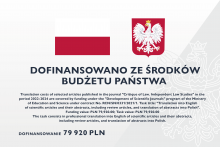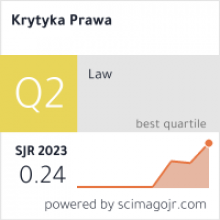Karem Sayed Aboelazm
2025
17
( 1 )
DOI: 10.7206/kp.2080-1084.766
Abstract
This paper attempts to present the constitutional and legal frameworks for the constitutional oversight of the legislative oversight in Portugal and South Africa and the various mechanisms that enable the Constitutional Court to monitor legislative oversight. The paper also presents the most critical repercussions that resulted from applying the constitutional oversight system over legislative oversight and the impact of these repercussions on rights and freedoms. It also addresses the quality and integrity of legislation and the effects of this oversight on the relationship between the constitutional judiciary and the parliament. The study uses two basic approaches: the comparative approach to compare South Africa and Portugal and the analytical approach to determine the repercussions of constitutional oversight on legislative oversight. The study seeks to answer several research questions that help clarify the mechanisms necessary to exercise this oversight.
Maciej Perkowski; Wojciech Zoń; Izabela Kraśnicka; Wioleta Hryniewicka-Filipkowska; Małgorzata Skórzewska-Amberg; Ewa M. Kwiatkowska; Katarzyna Staszyńska; Maciej Oksztulski
2025
17
( 1 )
DOI: 10.7206/kp.2080-1084.764
Abstract
This article analyses the impact of legal research on the education of future lawyers in Poland, focusing in particular on legal regulations and educational practices. The study aims to explain how the findings of research projects, especially of those funded by the National Science Centre (NSC)10, can be applied in teaching. The authors hypothesise that basic research has a minimal effect on legal education, which may result from the applicable legislation and internal conditions within university. The research involved an analysis of legal documents, a literature review, as well as surveys and interviews with academic staff. It examined the relationship between research and teaching activities in the context of higher education reform. The findings indicate that while most academics perceive their teaching and research as synergistic, there exist barriers in this areas – such as low motivation for research among students. The authors emphasise the need for reforms to better integrate research with teaching, which is crucial for enhancing the quality of legal education.
Natalya V. Mishyna; Olexandr V. Batanov; Vladyslav Leonidovic Fedorenko; Natalya M. Batanova
2022
14
( 2 )
DOI: 10.7206/kp.2080-1084.525
Abstract
The aim of the article is to offer proposals for reforming and speeding up health care in Ukraine, in particular by comparing the current system with a decentralized system. The methodology of this research follows basic social science methods (formal analysis, inductive method, deductive method, analogy, synthesis, etc.). With these methods, we address the issues of the health care reform in Ukraine. The article explores the issue of improving the health care in Ukraine. The Ukrainian government is carrying out two important reforms – a health care reform and a decentralization reform that includes changes in the municipal government. These two reforms have a huge potential for improving Ukraine’s health care system. Such potential remains largely untapped.
Adam Zienkiewicz
2021
13
( 3 )
DOI: 10.7206/kp.2080-1084.476
Abstract
This paper presents the issue of a lawyer’s integrity from the perspective of the assumptions underlying the original concept of a holistic approach to law and legal practice. In the course of the discussion, the basic principles of legal holism, the assumed understanding of lawyer’s integrity and their personal qualities forming the lawyer personality, and the problem of integrity in the context of the formula (model) shaping the lawyer-client relationship will be introduced. Legal holism recognises a lawyer’s self-knowledge, their conscious choice of professional role(s), the ways in which they are performed and the formula for working with clients and parties to disputes as crucial issues for the practice of law. It emphasises their complexity and possible impact on the postulated observance by a lawyer of the integrity of attitudes and actions in professional and private life. The author represents a research approach related to the concept of ontological and methodological multidimensionality of legal phenomena and the postulate of the so-called external integration of jurisprudence with the achievements of other sciences, including branches other than social (e.g. psychology or sociology).
Maciej Rogalski
2021
13
( 2 )
DOI: 10.7206/kp.2080-1084.453
Abstract
The paper is devoted to selected issues concerning acts from the same day, i.e. 29 July 2020: the Electronic Communications Law, and the act introducing the Electronic Communications Law. Both drafts have been prepared in connection with implementing the provisions of Directive (EU) 2018/1972 of the European Parliament and of the Council of 11 December 2018 Establishing the European Electronic Communications Code (‘the EECC’) into the Polish legal order. Only selected issues from both draft acts were presented, for which the basic selection criterion was their significant practical importance in terms of their influence on the functioning of the telecommunications market in Poland. The purpose of the analysis and research was to answer the question whether the proposed regulations were compliant with the EECC and whether, from the perspective of the requirements of practice, effective solutions had been adopted. The analysis was based on comparing the projected EECC regulations and on possible practical consequences after their implementation. The analysis covers the projected provisions – from the Polish law and the EU law. The conducted analysis indicated a need for modifying them, in particular: imposing security obligations; the scope and manner of replacing the existing documents for customers with new ones; the conditions of customerv ideo verification; transitional provisions. The article presents proposals for specific amendments to the projected provisions. The presented issues are not only of theoretical importance, but also of great practical importance when it comes to the functioning of the telecommunications market and, above all, when it comes to customerswho use telecommunications services
Anna Juzaszek; Maciej Juzaszek; Jan Bazyli Klakla
2021
13
( 2 )
DOI: 10.7206/kp.2080-1084.449
Abstract
In the paper, we deal with the issue of education of lawyers in doctoral schools in
Joanna Markiewicz-Stanny
2020
12
( 4 )
DOI: 10.7206/kp.2080-1084.413
Abstract
The research objective of this paper is to determine the impact that the repressive nature of the European Commission’s amendments to Directive 2008/115 will likely have on the two basic values of the return policy, that is, its fairness and effectiveness. The basic thesis of this study is that the direction of the directive’s recast, assuming – inter alia – an extension of the list of circumstances for applying the entry ban and detention, is contrary to the declared fairness of the migration policy towards third-country nationals. At the same time, the effectiveness of the planned changes is already questionable at the stage of draft legislation. These considerations are based on a juxtaposition of the proposed changes with currently binding legislation, the Commission’s soft law and the case law of the CJEU. The final effect of these analyses is the finding that the solutions proposed by the Commission will lead to an inevitable increase in the use of coercive measures against irregular immigrants in a way that stands in fundamental contradiction to the declared fairness and proportionality of EU actions. In this context, the effectiveness of the return policy should not be identified with a percentage of returns, but rather with the recognised necessity of overall and perfect control over irregular migrants. At the same time, the Recast Return Directive will contribute to the development of an already existing tendency to treat migration law as an instrument of security and public order, and to use administrative law measures so that they function in a manner equivalent to that of a criminal sanction.
Anna Haładyj
2020
12
( 1 )
DOI: 10.7206/kp.2080-1084.364
Abstract
Environmental impact assessment (EIA) is a tool that allow predicting the environmental
Anna Haładyj
2020
12
( 1 )
DOI: 10.7206/kp.2080-1084.363
Abstract
Environmental impact assessment (EIA) is a tool that allow predicting the environmental effects of a project. Undoubtedly, the basic element of the EIA is the EIA report: and if so, the question arises who is qualified to prepare the report. The purpose of the study is to present the evolution of the rights of EIA report experts from the 1970s to modern times, presented from the perspective of legal sciences. The implementation of the amended Directive 2011/92 took place from 1 January 2017 by introducing formal education criteria and/or experience for EIA experts, which were softened by the amendment of 19 July 2019. In the study, I put forward the thesis that there is a tendency in Polish legislation
Kamila Wysocka
2018
10
( 2 )
DOI: 10.7206/kp.2080-1084.213
Abstract
This article covers considerations on the e-mail marketing of financial products and services aimed at consumers. The research paper presents the practice of banks used by those institutions in the e-marketing; basic concepts such as information, offer, advertisement, communication or spam have been considered. The article addresses in particular relevant problems linked to sending advertising materials by e-mail, i.e specifying what types of messages a bank may send to its customers, whether a bank may send such messages to all its customers, whether a bank may send such messages only to its customers, what the consumers rights with respect to receiving unwanted and unsolicited commercial information are. The research paper took into consideration current judicature and views of legal writers.







